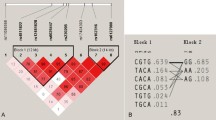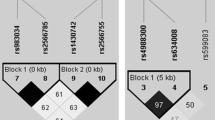Abstract
Summary
ALOX12 produces ligands for PPARγ thereby turning mesenchymal stem cells into adipocytes instead of osteoblasts. We investigated the effect of polymorphisms in the ALOX12 gene on BMD and fracture risk in two Danish cohorts and found four polymorphisms and a haplotype thereof to be associated with BMD and fracture risk.
Introduction
Stimulation of the PPARγ with ligands produced by the ALOX enzymes drives mesenchymal stem cells in an adipocyte direction at the expense of osteoblasts leading to decreased osteoblast number and BMD. Previously, polymorphisms in the ALOX12 gene have been associated with osteoporosis.
Methods
We examined the effect of ALOX12 polymorphisms on BMD and the risk of fractures in two Danish cohorts: AROS, a case–control population comprising 809 individuals and DOPS, a population comprising 1,716 perimenopausal women allocated to hormone therapy or not at baseline and followed for up to 10 years. On the basis of linkage disequilibrium (LD) between SNPs throughout the gene and previous genetic association studies we chose ten polymorphisms for investigation. Genotyping was carried out using the Sequenom MassARRAY genotyping system and TaqMan assays.
Results
In AROS, individuals heterozygous for the polymorphisms rs3840880, rs9897850, rs2292350 and rs1126667 had a 3.0–4.7% decreased lumbar spine BMD (p = 0.02–0.06) and an increased risk of vertebral fractures (p < 0.05) compared with individuals homozygous for either allele. In DOPS, none of the individual SNPs were associated with BMD or incident fractures. In both cohorts, the above-mentioned SNPs comprised an LD-block (pairwise D´ = 1.0, r 2 = 0.45–0.97). A haplotype comprising all the common alleles (frequency 9%) was associated with decreased bone loss at the hip (p < 0.05) and decreased incidence of osteoporotic fractures (p < 0.05) in DOPS and increased femoral neck BMD in AROS (p < 0.05).
Conclusion
Our study suggests that genetic variants in ALOX12 may influence BMD and fracture risk.


Similar content being viewed by others
References
Eriksen EF, Hodgson SF, Eastell R, Cedel SL, O'Fallon WM, Riggs BL (1990) Cancellous bone remodeling in type I (postmenopausal) osteoporosis: quantitative assessment of rates of formation, resorption, and bone loss at tissue and cellular levels. J Bone Miner Res 5:311–319
Slemenda CW, Christian JC, Williams CJ, Norton JA, Johnston CC Jr (1991) Genetic determinants of bone mass in adult women: a reevaluation of the twin model and the potential importance of gene interaction on heritability estimates. J Bone Miner Res 6:561–567
Hunter D, De Lange M, Snieder H, MacGregor AJ, Swaminathan R, Thakker RV, Spector TD (2001) Genetic contribution to bone metabolism, calcium excretion, and vitamin D and parathyroid hormone regulation. J Bone Miner Res 16:371–378
Langdahl BL, Lokke E, Carstens M, Stenkjaer LL, Eriksen EF (2000) A TA repeat polymorphism in the estrogen receptor gene is associated with osteoporotic fractures but polymorphisms in the first exon and intron are not. J Bone Miner Res 15:2222–2230
van Meurs JB, Trikalinos TA, Ralston SH, Balcells S, Brandi ML, Brixen K, Kiel DP, Langdahl BL, Lips P, Ljunggren O, Lorenc R, Obermayer-Pietsch B, Ohlsson C, Pettersson U, Reid DM, Rousseau F, Scollen S, Van HW, Agueda L, Akesson K, Benevolenskaya LI, Ferrari SL, Hallmans G, Hofman A, Husted LB, Kruk M, Kaptoge S, Karasik D, Karlsson MK, Lorentzon M, Masi L, McGuigan FE, Mellstrom D, Mosekilde L, Nogues X, Pols HA, Reeve J, Renner W, Rivadeneira F, van Schoor NM, Weber K, Ioannidis JP, Uitterlinden AG (2008) Large-scale analysis of association between LRP5 and LRP6 variants and osteoporosis. JAMA 299:1277–1290, %19
Grant SF, Reid DM, Blake G, Herd R, Fogelman I, Ralston SH (1996) Reduced bone density and osteoporosis associated with a polymorphic Sp1 binding site in the collagen type I alpha 1 gene. Nat Genet 14:203–205
Langdahl BL, Knudsen JY, Jensen HK, Gregersen N, Eriksen EF (1997) A sequence variation: 713-8delC in the transforming growth factor-beta 1 gene has higher prevalence in osteoporotic women than in normal women and is associated with very low bone mass in osteoporotic women and increased bone turnover in both osteoporotic and normal women. Bone 20:289–294
Gimble JM, Zvonic S, Floyd ZE, Kassem M, Nuttall ME (2006) Playing with bone and fat. J Cell Biochem 98:251–266
Meunier P, Aaron J, Edouard C, Vignon G (1971) Osteoporosis and the replacement of cell populations of the marrow by adipose tissue. A quantitative study of 84 iliac bone biopsies. Clin Orthop Relat Res 80:147–154
Ali AA, Weinstein RS, Stewart SA, Parfitt AM, Manolagas SC, Jilka RL (2005) Rosiglitazone causes bone loss in mice by suppressing osteoblast differentiation and bone formation. Endocrinology 146(3):1226–1235, Epub.2004
Akune T, Ohba S, Kamekura S, Yamaguchi M, Chung UI, Kubota N, Terauchi Y, Harada Y, Azuma Y, Nakamura K, Kadowaki T, Kawaguchi H (2004) PPARgamma insufficiency enhances osteogenesis through osteoblast formation from bone marrow progenitors. J Clin Invest 113:846–855
Kawaguchi H, Akune T, Yamaguchi M, Ohba S, Ogata N, Chung UI, Kubota N, Terauchi Y, Kadowaki T, Nakamura K (2005) Distinct effects of PPARgamma insufficiency on bone marrow cells, osteoblasts, and osteoclastic cells. J Bone Miner Metab 23:275–279
Nosjean O, Boutin JA (2002) Natural ligands of PPARgamma: are prostaglandin J(2) derivatives really playing the part? Cell Signal 14:573–583
Huang JT, Welch JS, Ricote M, Binder CJ, Willson TM, Kelly C, Witztum JL, Funk CD, Conrad D, Glass CK (1999) Interleukin-4-dependent production of PPAR-gamma ligands in macrophages by 12/15-lipoxygenase. Nature 400:378–382
Klein RF, Allard J, Avnur Z, Nikolcheva T, Rotstein D, Carlos AS, Shea M, Waters RV, Belknap JK, Peltz G, Orwoll ES (2004) Regulation of bone mass in mice by the lipoxygenase gene Alox15. Science 303:229–232
Mullin BH, Spector TD, Curtis CC, Ong GN, Hart DJ, Hakim AJ, Worthy T, Wilson SG (2007) Polymorphisms in ALOX12, but not ALOX15, are significantly associated with BMD in postmenopausal women. Calcif Tissue Int 81:10–17
Ichikawa S, Koller DL, Johnson ML, Lai D, Xuei X, Edenberg HJ, Klein RF, Orwoll ES, Hui SL, Foroud TM, Peacock M, Econs MJ (2006) Human ALOX12, but not ALOX15, is associated with BMD in white men and women. J Bone Miner Res 21:556–564
Mosekilde L, Hermann AP, Beck-Nielsen H, Charles P, Nielsen SP, Sorensen OH (1999) The Danish osteoporosis prevention study (DOPS): project design and inclusion of 2000 normal perimenopausal women. Maturitas 31:207–219
Genant HK, Grampp S, Gluer CC, Faulkner KG, Jergas M, Engelke K, Hagiwara S, Van Kuijk C (1994) Universal standardization for dual x-ray absorptiometry: patient and phantom cross-calibration results. J Bone Miner Res 9:1503–1514
Abrahamsen B, Gram J, Hansen TB, Beck-Nielsen H (1995) Cross calibration of QDR-2000 and QDR-1000 dual-energy X-ray densitometers for bone mineral and soft-tissue measurements. Bone 16:385–390
McCloskey EV, Spector TD, Eyres KS, Fern ED, O'Rourke N, Vasikaran S, Kanis JA (1993) The assessment of vertebral deformity: a method for use in population studies and clinical trials. Osteoporos Int 3:138–147
Heinemeyer T, Wingender E, Reuter I, Hermjakob H, Kel AE, Kel OV, Ignatieva EV, Ananko EA, Podkolodnaya OA, Kolpakov FA, Podkolodny NL, Kolchanov NA (1998) Databases on transcriptional regulation: TRANSFAC, TRRD and COMPEL. Nucleic Acids Res 26:362–367
Fridman C, Ojopi EP, Gregorio SP, Ikenaga EH, Moreno DH, Demetrio FN, Guimaraes PE, Vallada HP, Gattaz WF, Dias NE (2003) Association of a new polymorphism in ALOX12 gene with bipolar disorder. Eur Arch Psychiatry Clin Neurosci 253:40–43
Miller SA, Dykes DD, Polesky HF (1988) A simple salting out procedure for extracting DNA from human nucleated cells. Nucleic Acids Res 16:1215
Barrett JC, Fry B, Maller J, Daly MJ (2005) Haploview: analysis and visualization of LD and haplotype maps. Bioinformatics 21(2):263–265, Epub.2004
Gonzalez-Bofill N, Husted LB, Harslof T, Tofteng CL, Abrahamsen B, Eiken P, Vestergaard P, Langdahl BL (2010) Effects of COLIA1 polymorphisms and haplotypes on perimenopausal bone mass, postmenopausal bone loss and fracture risk. Osteoporos Int Ref Type. doi:10.1007/s00198-010-1292-4
Khoury MJ, Beaty TH, Cohen BH (eds) (1993) Fundamentals of genetic epidemiology. Oxford University Press, New York
Hosking L, Lumsden S, Lewis K, Yeo A, McCarthy L, Bansal A, Riley J, Purvis I, Xu CF (2004) Detection of genotyping errors by Hardy-Weinberg equilibrium testing. Eur J Hum Genet 12:395–399
Salanti G, Amountza G, Ntzani EE, Ioannidis JP (2005) Hardy-Weinberg equilibrium in genetic association studies: an empirical evaluation of reporting, deviations, and power. Eur J Hum Genet 13:840–848
Knudsen S, Harslof T, Husted LB, Carstens M, Stenkjaer L, Langdahl BL (2007) The effect of interleukin-1alpha polymorphisms on bone mineral density and the risk of vertebral fractures. Calcif Tissue Int 80:21–30
Husted LB, Harslof T, Gonzalez-Bofill N, Schmitz A, Carstens M, Stenkjaer L, Langdahl BL (2009) Haplotypes of promoter and intron 1 polymorphisms in the COLIA1 gene are associated with increased risk of osteoporosis. Calcif Tissue Int 84:85–96
Langdahl BL, Carstens M, Stenkjaer L, Eriksen EF (2003) Polymorphisms in the transforming growth factor beta1 gene and osteoporosis. Bone 32:297–310
Langdahl BL, Carstens M, Stenkjaer L, Eriksen EF (2002) Polymorphisms in the osteoprotegerin gene are associated with osteoporotic fractures. J Bone Miner Res 17:1245–1255
Liu Y, Freedman BI, Burdon KP, Langefeld CD, Howard T, Herrington D, Goff DC Jr, Bowden DW, Wagenknecht LE, Hedrick CC, Rich SS (2008) Association of arachidonate 12-lipoxygenase genotype variation and glycemic control with albuminuria in type 2 diabetes. Am J Kidney Dis 52:242–250
Comings DE, MacMurray JP (2000) Molecular heterosis: a review. Mol Genet Metab 71:19–31
Tasker PN, Macdonald H, Fraser WD, Reid DM, Ralston SH, Albagha OM (2006) Association of PLOD1 polymorphisms with bone mineral density in a population-based study of women from the UK. Osteoporos Int 17:1078–1085
Aleem AM, Jankun J, Dignam JD, Walther M, Kuhn H, Svergun DI, Skrzypczak-Jankun E (2008) Human platelet 12-lipoxygenase, new findings about its activity, membrane binding and low-resolution structure. J Mol Biol 376:193–209
Hsueh Y (2002) The Hawthorne experiments and the introduction of Jean Piaget in American industrial psychology, 1929–1932. Hist Psychol 5:163–189
Kompier MA (2006) The “Hawthorne effect” is a myth, but what keeps the story going? Scand J Work Environ Health 32:402–412
McCarney R, Warner J, Iliffe S, van Haselen R, Griffin M, Fisher P (2007) The Hawthorne effect: a randomised, controlled trial. BMC Med Res Methodol 7:30, 30
Acknowledgements
This work was supported by a grant from The Villum Kann Rasmussen Foundation.
Conflicts of interest
None.
Author information
Authors and Affiliations
Corresponding author
Rights and permissions
About this article
Cite this article
Harsløf, T., Husted, L.B., Nyegaard, M. et al. Polymorphisms in the ALOX12 gene and osteoporosis. Osteoporos Int 22, 2249–2259 (2011). https://doi.org/10.1007/s00198-010-1472-2
Received:
Accepted:
Published:
Issue Date:
DOI: https://doi.org/10.1007/s00198-010-1472-2




